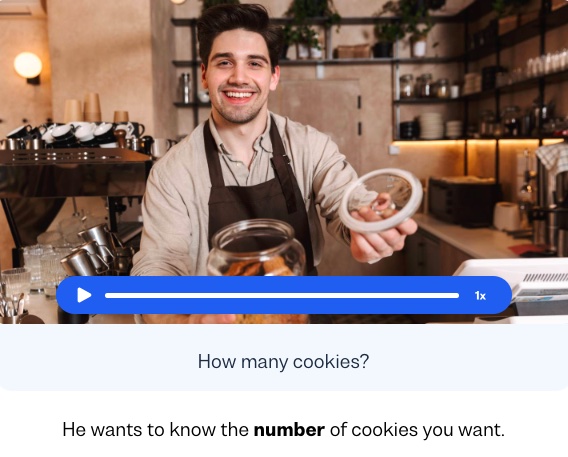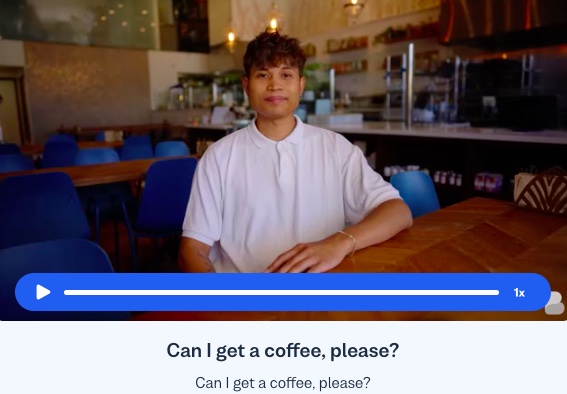10 Types of Nouns in English You Need to Know
From common to uncountable, learn all the various types of English nouns with examples.
I want to learn...
Welcome to your crash course on English nouns! If you've ever wondered about the different types of nouns and how to use them effectively, you're in the right place. In this article, we'll walk you through the ten essential types of nouns in English, providing clear explanations and practical examples to help you grasp each concept with ease.
From common nouns that name everyday objects to proper nouns pinpointing specific people, places, and things, we've got you covered. Whether you're a beginner looking to build a solid foundation or a seasoned learner aiming to polish your English skills, mastering the different types of nouns will empower you to express yourself confidently in any English conversation.
So, let's dive in and unlock the world of English nouns together!
What are nouns?
Nouns are names for persons, places, or things that can also refer to concepts and other abstract objects.
Examples: man, anger, uncle Joe, dog, book
Now that we know what nouns are, let us look at different types of nouns. Some of the most important ones are mentioned below.
10 types of nouns in English
Here is an overview of 10 types of English nouns with examples and usages to guide you.
1. Common nouns
What are common nouns?
Common nouns are in all places, and we use them while conversing without even realizing it. They are used to describe general and non-specific items.
Generally, while writing, common nouns are not capitalized unless they are the first alphabet of the first word or part of a title.
Examples: writer, car, girl, language, city
Usage: The city of New York is known for its vibrant culture.
2. Proper nouns
What are proper nouns?
Unlike, common nouns. proper nouns refer to a specific person, place, or thing. It usually starts with a capital letter.
Example: London, BMW, Sally, English.
Usage: London is one of the best cities in the world.
3. Singular nouns
What is a singular noun?
It is a word that refers to one person, place, thing, or idea. It's the basic form of a noun, denoting a single entity rather than multiple ones. Singular nouns are the most common type of nouns and are used extensively in everyday language. Here are some examples and usage explanations:
Examples: apple, city, book, freedom
Usage: I ate an apple today.
4. Plural nouns
A plural noun is a word that refers to more than one person, place, thing, or idea. Unlike singular nouns, which indicate only one entity, plural nouns indicate multiple entities.
Example: apples, cities, books etc.
Usage: She bought five apples at the grocery store.
5. Countable nouns
Countable nouns are for people, things, animals, ideas, and places that can be counted. It can be in a singular or plural form.
Examples: book, table, cat
Usage: There is a book in the library.
It is important to note that countable nouns will always use an article (a, an, or the) when they are singular.
6. Uncountable nouns
Things that cannot be counted are referred to as uncountable nouns. Also, uncountable nouns are always used in the singular form. We can't add an s to it.
Example: music, air, health
Usage: Listening to music makes me feel calm.
In some situations, the same noun can be countable and uncountable, often with a change of meaning.
Examples:
● There is too much light.
● There is one light in the hall.
7. Compound nouns
Compound nouns are nouns that are made up of two or more words. These words are very common and are a part of everyday vocabulary.
Examples: bedroom, password, air conditioner, etc.
Usage: I renovated my bedroom this week.
8. Collective nouns
Collective nouns are words that denote a collection or group of things and people.
Example: bunch of flowers, pack of cards
Usage: He gave me a bunch of flowers.
Whether to consider collective nouns as singular or plural is by far the most often asked question about them. Should you put "the group is" or "the group are" instead? Both may be correct. Depending on the meaning of the sentence, we should use a collective noun in the singular or plural.
Examples:
● The audience is happy.
● The audience is all wearing red caps.
9. Concrete nouns
Things, places, or people that you can experience with one or more than one of your five senses are termed concrete nouns.
Examples: phone, voice, London, etc.
Usage: I cannot hear her voice on the phone!
10. Abstract nouns
Abstract nouns are types of nouns that you can’t touch, see or directly experience through any of the five senses. It denotes something abstract and immaterial.
Examples: love, happiness, danger, etc.
Usage: Happiness is a journey and not a destination.
Nouns as subjects
There must be a subject in every sentence, and that subject must always be a noun. The person, place, or object that is doing or becoming the sentence's verb is known as the subject of the sentence.
Example: Sam left the party early.
Nouns as object
When a noun is an object, the noun would receive the action of the verb.
Example: The plane carried the Prime Minister to India.
Nouns as object and subject complements
Subject complements and object complements fill out and complete our sentences. The object complement gives details about the object of the sentence, whereas the subject complement gives information about the subject of the sentence.
Examples:
● She painted the wall pink (object complement)
● Monica is a good singer (subject complement)
What are gerunds?
As you might be aware, a verb is a word that refers to actions or states of being. If we talk about gerunds, then gerunds are words formed with verbs that end in –ing and are used as nouns. A gerund looks like a verb but acts like a noun. It is essential to know that the present participle also ends with –ing, so it is important to pay close attention to words that act as a noun and the ones that do not act as nouns.
Examples:
● I'm trying to focus (trying –verb).
● He loves traveling (traveling-gerund)
We hope this article helped you to understand everything about nouns. Learning about nouns will make your English learning journey easy. If you want to master learning English, then don’t wait to join Busuu interactive lessons now.!
There is so much more English to learn!
Busuu’s online course is the place to find more essential, everyday language that you’ll use like this. Take your knowledge to the next level.

